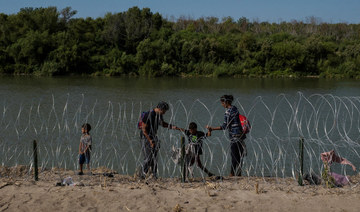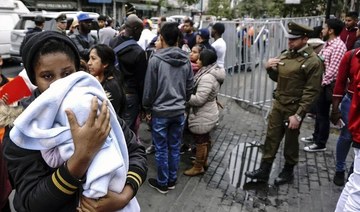PARIS: A modeling agent associated with disgraced US financier Jeffrey Epstein has been charged in France with sexual harassment and the rape of minors over 15 years old.
Jean-Luc Brunel was arrested as part of an ongoing investigation on Wednesday at Charles de Gaulle airport as he was preparing to take a flight to Senegal.
The Paris prosecutor announced in a statement Saturday that the charges were handed out Friday by a magistrate at the end of Brunel’s custody period. It said Brunel was not handed any human trafficking charges, which was one of the main lines of inquiry. The magistrate decided that there was not currently enough evidence to rule on that count, but he was not acquitted and could be charged in the future if anything new emerges. Brunel was remanded in custody.
Brunel is being investigated as part of a broad French probe into alleged sexual exploitation of women and girls by Epstein and his circle. Multiple women have identified themselves as victims and spoken to police since the French probe was opened in August last year, the same month in which Epstein committed suicide in jail.
A former model who testified to French police that she was drugged and raped as a teenager by Brunel said she wept tears of joy at the news of his detention.
Epstein-linked modeling agent charged with rape of minors
Epstein-linked modeling agent charged with rape of minors
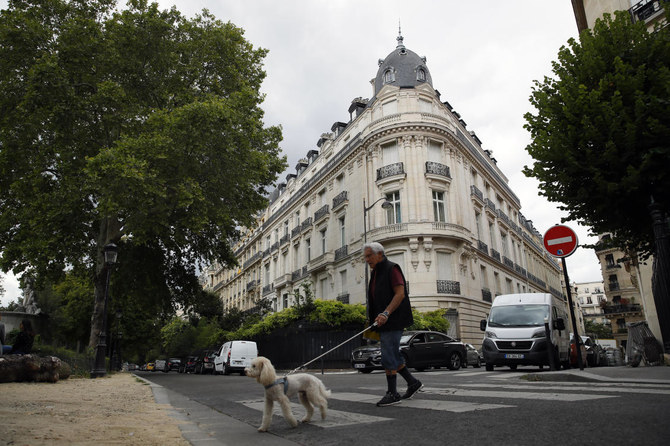
‘For sake of humanity’: Thousands rally in northwest Pakistan against Israel’s war on Gaza

- The rally was organized by the Jamat-e-Islami (JI) religious party, which has held several similar protests in recent months
- It came as another Israeli strike killed 31 people in Gaza on Sunday amid US national security adviser’s visit to Israel for talks
PESHAWAR: Thousands of Pakistanis, including students, activists and politicians, gathered on Sunday in the northwestern Pakistani city of Peshawar to demand an end to Israel’s war on Gaza.
The rally, called ‘Gaza Million March,’ was organized by the Jamat-e-Islami (JI) religious party, which has held several protests and marches in recent months to condemn Israeli military actions in Palestine.
The war broke out after the Oct. 7 Hamas attack on Israel, which resulted in the deaths of more than 1,100 people. Israel’s retaliatory offensive against Hamas has killed at least 35,456 Palestinians, mostly civilians, according to the Palestinian health ministry.
Speaking to participants of the rally, JI chief Hafiz Naeem-ur-Rehman lamented that men, women, children, journalists and human rights activists had been killed in Palestine, but world leaders and rights groups remained silent.
“They want no one to raise their voice for Palestine or against [Israeli] oppression,” he said, adding, “For the freedom of Palestine, we will march in every street.”

Participants of Sunday’s rally said they had gathered to express solidarity with Palestinians and raise their voice against Israel’s actions.
“The reason for our assembly here is to show solidarity with Gaza,” said Amir Hamza, 24.
Mian Hafiz Naeem, another participant who came from the Balakot town, criticized Pakistani politicians “for not doing enough” on the Gaza situation.
“They are not realizing that not only Muslims, but humanity is being killed over there,” he said, adding that he came to attend the rally “for the sake of humanity.”
Pakistan does not recognize the state of Israel and maintains its support for an independent Palestinian state with Jerusalem as its capital, based on pre-1967 borders.
In recent months, the South Asian country has repeatedly raised the issue of Israel’s war on Gaza at the United Nations through its permanent representative, Ambassador Munir Akram.
Dr. Noreena Arshad, a resident of Peshawar who came to the rally along with her daughters, said she did not belong to any political group and came to the rally with the sole purpose of expressing solidarity with the Palestinians.
“I don’t belong to any political party or organization, but I am here to stand in solidarity with Gaza and Palestine,” she told Arab News. “This is the least of faith that we should believe at least in our hearts that they [Palestinians] are being oppressed.”
Over 300 Pakistani students evacuated from Kyrgyzstan following mob violence against foreigners

- Separate flights carrying 140, 175 Pakistani students arrived in Islamabad, Lahore respectively on Sunday night
- Pakistan has started evacuating students from Bishkek after violent attacks last week against foreigners
ISLAMABAD: Two separate flights carrying over 300 Pakistani students from Kyrgyzstan arrived in Lahore and Islamabad on Sunday night, days after violent clashes in the central Asian country forced Islamabad to evacuate its nationals and arrange for their safe return.
Videos of a brawl between Kyrgyz and Egyptian students went viral on social media last week, prompting frenzied mobs to target hostels of medical universities and private lodgings of international students, including Pakistanis, in the city.
Pakistan has since then ramped efforts to repatriate its students from the city, dispatching commercial and special flights to the country. According to official statistics, around 10,000 Pakistani students are enrolled in various educational institutions in Kyrgyzstan, with nearly 6,000 residing and studying in Bishkek. Foreign Minister Dar on Sunday confirmed no Pakistani had died in the clashes.
The first batch of around 130 Pakistani students from Kyrgyzstan arrived in the eastern city of Lahore late Saturday night. On Sunday, another flight carrying 140 Pakistani students from Kyrgyzstan arrived in Islamabad and was received by Federal Minister of Petroleum Musadik Malik.
“I have no words to describe your situation but I feel the pain and suffering that you and your parents have gone through,” Malik told the students upon their arrival in the country. He said some students did not want to return to Pakistan on account of their exams.
“Any student who wants to come, we will bring them,” he vowed.
Separately, another flight arrived at the Allama Iqbal International Airport in Lahore on Sunday night with 175 Pakistani students from Bishkek. Information Minister Ataullah Tarar welcomed the students, saying that Islamabad was in touch with Bishkek over the current situation.
“Our ambassador in Kyrgyzstan is in contact with students,” Tarar was quoted as saying by the information ministry. “On Prime Minister Shehbaz Sharif’s instructions, special arrangements have made to shift the Pakistani students from the airports [to their homes.]”
Pakistan’s ambassador to Kyrgyzstan Hasan Zaigham said on Saturday that five Pakistani medical students had been injured in the mob attack. One student was admitted to a local hospital with a jaw injury, while the other four were released after receiving first aid.
Pakistan’s foreign ministry said on Saturday it had summoned and handed a note of protest to Kyrgyzstan’s top diplomat in the country in response to violence against Pakistani students in Bishkek.
India begins voting in fifth phase as Mumbai, Gandhi family boroughs head to polls

- World’s largest election began on April 19 and will conclude on June 1
- Congress leader Rahul Gandhi is contesting from Raebareli, Wayanad seats
MUMBAI: India began voting in the fifth phase of its mammoth general elections on Monday, with seats in the financial capital Mumbai and the opposition’s Gandhi family bastions set to be sealed in the last few legs of the seven-phase vote.
The world’s largest election began on April 19 and will conclude on June 1, with votes set to be counted on June 4.
Monday’s phase has the least number of seats being contested, with 89.5 million voters set to choose representatives for 49 seats.
Several high-profile candidates are in the fray on Monday — including defense minister Rajnath Singh from Lucknow and trade minister Piyush Goyal from Mumbai — cities which have suffered from a dismal voter turnout in the past.
The Election Commission on Sunday specifically called upon residents of those cities “to erase the stigma” of urban apathy.
“At the core of our vision for Mumbai is – better infrastructure and more ‘ease of living,” Prime Minister Narendra Modi said while campaigning in the city last week, just days after at least 14 people were killed when a massive billboard fell during a rainstorm.
Two boroughs of the Congress party’s Nehru-Gandhi dynasty in the politically-crucial Uttar Pradesh are also going to polls, with scion Rahul Gandhi contesting the seat of Raebareli, in addition to Wayanad in the south which has already voted. India allows candidates to contest multiple constituencies but represent only one.
Sonia Gandhi, Congress party chief and former lawmaker from Raebareli, made an emotional appeal to voters asking them to vote for her son in a region that the Bhartiya Janata Party (BJP) has dominated in the last 10 years.
Smriti Irani, minister for women and child development, is contesting from Amethi. In 2019, she defeated Rahul Gandhi in a seat his family held continuously for the last four decades.
Among other keenly watched electorates in the state is Kaiserganj, where the BJP is fielding a former wrestling federation chief’s son, despite his father being charged with sexually harassing female wrestlers.
Poor voter turnout became a concern for the ruling BJP initially, and analysts believe the low numbers cast doubts on the landslide victory the party and its allies sought.
After an initial poor performance, more people started casting their vote with an average turnout of 66.95 percent in four phases, and 69 percent in the fourth one on May 13.
Modi, widely expected to return as prime minister for a third consecutive term, has been accused by opponents of targeting minority Muslims to please hard-line voters.
Modi has repeatedly accused the Congress party of planning to extend welfare benefits to Muslims at the expense of disadvantaged tribal groups and Hindu castes, a claim the Congress has denied.
In a recent television interview aired after the fourth phase, Modi said it was his resolve to “not do Hindu-Muslim (in politics).”
The opposition INDIA alliance, consisting of Congress and a dozen political parties, got a major boost after fierce Modi critic and Chief Minister of Delhi Arvind Kejriwal was given temporary relief by the court and allowed to campaign in the elections.
Pope Francis calls anti-migrant attitudes at US border ‘madness’

- Record numbers of migrants fleeing poverty and violence have been seeking to enter the US, largely from Central America and Venezuela
- The matter has emerged as a top political issue in the November US election, with Biden and challenger Trum, pushing the topic front and center
WASHINGTON: Pope Francis made a foray into the US election season with a rare television interview Sunday, calling harsh anti-migrant attitudes “madness” and criticizing right-wing US Catholic figures for overly conservative stances against his social teachings.
Speaking in his native Spanish through a translator for more than an hour, Francis told CBS News program “60 Minutes” that the closing by the state of Texas of a Catholic charity offering humanitarian assistance was absurd.
“That is madness. Sheer madness. To close the border and leave them there, that is madness. The migrant has to be received,” the pope said.
“Thereafter you see how you are going to deal with him. Maybe you have to send him back, I don’t know, but each case ought to be considered humanely,” Francis said.
Record numbers of migrants have been seeking to enter the United States, largely from Central America and Venezuela, as they flee poverty, violence and disasters exacerbated by climate change.
The matter has emerged as a top political issue in the November US election, with President Joe Biden’s Republican challenger, former president Donald Trump, pushing the topic front and center.
“The globalization of indifference” on migrants, Francis said, “is a very ugly disease.”
Francis, 87, also addressed criticisms by conservative US bishops who oppose his efforts to revisit certain teachings and traditions.
A “conservative is one who clings to something and does not want to see beyond that,” he said when asked about the bishops, adding “it is a suicidal attitude.”
Since his election in 2013, Pope Francis has insisted on the importance of a church open to all, including member of the LGBT community, but he has faced strong resistance from conservative Catholics.
There was a particularly strong reaction when Francis opened the door to the blessing of gay couples last year, especially in African countries.
Calling gay people “a human fact,” Francis said in the interview: “To bless each person, why not? The blessing is for all.”
The pontiff also touched on the controversial topic of sex abuse within the Catholic Church.
He has made combatting sexual assault in the Church one of the main missions of his papacy, and insisted on a “zero tolerance” policy following multiple wide-reaching scandals.
“Unfortunately, the tragedy of the abuses is enormous,” he told CBS, adding that abuse “cannot be tolerated.”
“When there is a case of a religious man or woman who abuses, the full force of the law falls upon them,” Francis said.
But, he added, “there has been a great deal of progress.”
Iran’s president, foreign minister and others found dead at helicopter crash site, state media says

- “We can see the wreckage and the situation does not look good,” Red Crescent official said
- Turkish drone footage suggesting the helicopter went down in the mountains
DUBAI: Iranian President Ebrahim Raisi, the country’s foreign minister and others have been found dead at the site of a helicopter crash Monday after an hourslong search through a foggy, mountainous region of the country’s northwest, state media reported. Raisi was 63.
The crash comes as the Middle East remains unsettled by the Israel-Hamas war, during which Raisi under Supreme Leader Ayatollah Ali Khamenei launched an unprecedented drone-and-missile attack on Israel just last month. Under Raisi, Iran enriched uranium closer than ever to weapons-grade levels, further escalating tensions with the West as Tehran also supplied bomb-carrying drones to Russia for its war in Ukraine and armed militia groups across the region.
Meanwhile, Iran has faced years of mass protests against its Shiite theocracy over its ailing economy and women’s rights – making the moment that much more sensitive for Tehran and the future of the country.
State TV gave no immediate cause for the crash in Iran’s East Azerbaijan province. Among the dead was Iranian Foreign Minister Hossein Amirabdollahian, 60.

Raisi was traveling in Iran’s East Azerbaijan province. State TV said what it called a “hard landing” happened near Jolfa, a city on the border with the nation of Azerbaijan, some 600 kilometers (375 miles) northwest of the Iranian capital, Tehran. Later, state TV put it farther east near the village of Uzi, but details remained contradictory.
With Raisi were Iran’s Foreign Minister Hossein Amirabdollahian, the governor of Iran’s East Azerbaijan province and other officials and bodyguards, the state-run IRNA news agency reported. One local government official used the word “crash,” but others referred to either a “hard landing” or an “incident.”
Early Monday morning, Turkish authorities released what they described as drone footage showing what appeared to be a fire in the wilderness that they “suspected to be wreckage of helicopter.” The coordinates listed in the footage put the fire some 20 kilometers (12 miles) south of the Azerbaijan-Iranian border on the side of a steep mountain.
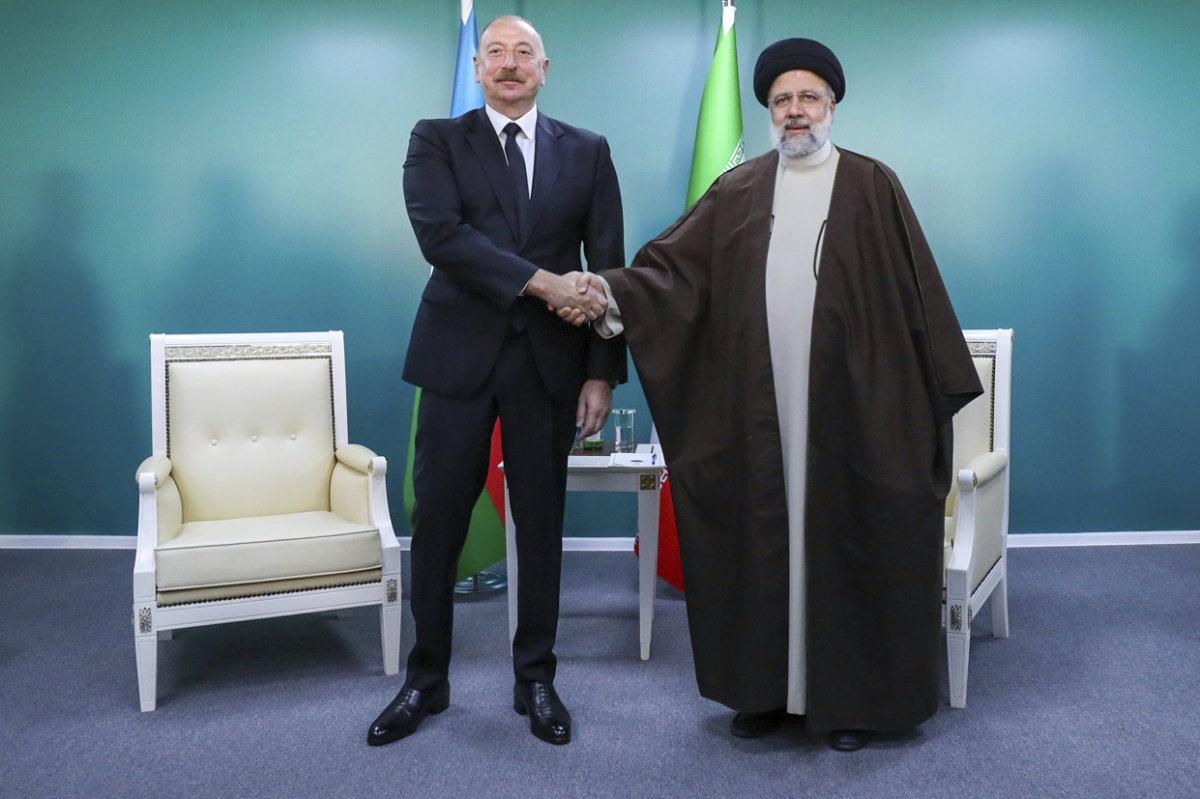
Footage released by the IRNA early Monday showed what the agency described as the crash site, across a steep valley in a green mountain range. Soldiers speaking in the local Azeri language said: “There it is, we found it.”
Shortly after, state TV in an on-screen scrolling text said: “There is no sign of live from people on board.” It did not elaborate, but the semiofficial Tasnim news agency showed rescuers using a small drone to fly over the site, with them speaking among themselves saying the same thing.
Religious leaders had urged the public to pray. State TV aired images of hundreds of the faithful, some with their hands outstretched in supplication, praying at Imam Reza Shrine in the city of Mashhad, one of Shiite Islam’s holiest sites, as well as in Qom and other locations across the country. State television’s main channel aired the prayers nonstop.
In Tehran, a group of men kneeling on the side of the street clasped strands of prayer beads and watched a video of Raisi praying, some of them visibly weeping.
“If anything happens to him we’ll be heartbroken,” said one of the men, Mehdi Seyedi. ”May the prayers work and may he return to the arms of the nation safe and sound.”
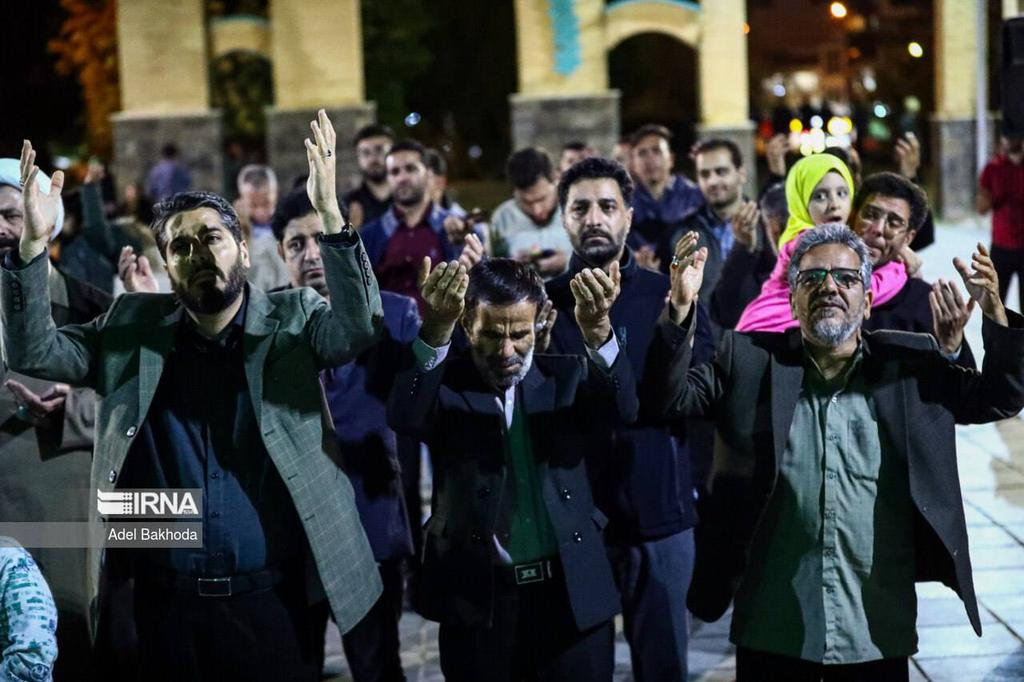
IRNA called the area a “forest” and the region is known to be mountainous as well. State TV aired images of SUVs racing through a wooded area and said they were being hampered by poor weather conditions, including heavy rain and wind. Rescuers could be seen walking in the fog and mist.
Khamenei himself also urged the public to pray.
“We hope that God the Almighty returns the dear president and his colleagues in full health to the arms of the nation,” Khamenei said, drawing an “amen” from the worshipers he was addressing.
However, the supreme leader also stressed the business of Iran’s government would continue no matter what. Under the Iranian constitution, Iran’s vice first president takes over if the president dies with Khamenei’s assent, and a new presidential election would be called within 50 days. First Vice President Mohammad Mokhber already had begun receiving calls from officials and foreign governments in Raisi’s absence, state media reported.
Raisi, 63, a hard-liner who formerly led the country’s judiciary, is viewed as a protégé of Khamenei and some analysts have suggested he could replace the 85-year-old leader after Khamenei’s death or resignation.

Raisi had been on the border with Azerbaijan early Sunday to inaugurate a dam with Azerbaijan’s President Ilham Aliyev. The dam is the third one that the two nations built on the Aras River. The visit came despite chilly relations between the two nations, including over a gun attack on Azerbaijan’s Embassy in Tehran in 2023, and Azerbaijan’s diplomatic relations with Israel, which Iran’s Shiite theocracy views as its main enemy in the region.
Iran flies a variety of helicopters in the country, but international sanctions make it difficult to obtain parts for them. Its military air fleet also largely dates back to before the 1979 Islamic Revolution. IRNA published images it described as Raisi taking off in what resembled a Bell helicopter, with a blue-and-white paint scheme previously seen in published photographs.

Raisi won Iran’s 2021 presidential election, a vote that saw the lowest turnout in the Islamic Republic’s history. Raisi is sanctioned by the US in part over his involvement in the mass execution of thousands of political prisoners in 1988 at the end of the bloody Iran-Iraq war.
Under Raisi, Iran now enriches uranium at nearly weapons-grade levels and hampers international inspections. Iran has armed Russia in its war on Ukraine, as well as launched a massive drone-and-missile attack on Israel amid its war against Hamas in the Gaza Strip. It also has continued arming proxy groups in the Mideast, like Yemen’s Houthi rebels and Lebanon’s Hezbollah.
Meanwhile, mass protests in the country have raged for years. The most recent involved the 2022 death of Mahsa Amini, a woman who had been earlier detained over allegedly not wearing a hijab, or headscarf, to the liking of authorities. The monthslong security crackdown that followed the demonstrations killed more than 500 people and saw over 22,000 detained.
In March, a United Nations investigative panel found that Iran was responsible for the “physical violence” that led to Amini’s death.



